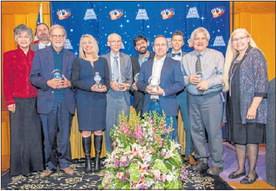Pasadena’s University Club was packed to capacity last month for the Rotary Humanitarian STAR (Science, Technology, Aerospace, Robotics) awards. These yearly accolades were established four years ago by the Rotary Clubs of Sierra Madre and San Marino to recognize innovations in Health and Medicine, Knowledge Sharing, Environmental Improvement and Disaster Relief and Recovery. Some have described them as the “Academy Awards for Science.”
This year’s brain trust included former Jet Propulsion Laboratory Director Ed Stone (1991–2001), the lead scientist of the historic Voyager Mission from 1972 to the present, who received the Lifetime Achievement Award.
The Helios Award went to John Mulchaey, director of Pasadena’s Carnegie Institute for Science.
He follows in the footsteps of the legendary astronomer George Ellery Hale who founded Carnegie Observatories in 1904.
His research has focused on dark matter and black holes in the local universe. Here are the winners in other categories: Health & Medical: Pediatrician Dr. Mark J. Manary whose life’s work has been the eradication of childhood malnutrition in Africa. His development of Project Peanut Butter has fed more than 1 million children. He oversees local production of the energydense, ready-to-use peanut butter paste to treat children with severe acute malnutrition in Malawi, Sierra Leone, Ghana and Cote D’Ivoire and operates 145 mobile clinics.
Honors also went to Dr. Stephen Forman and Christine Brown, leaders of a medical research team at City of Hope on immunotherapy for the cancer treatment known as CAR T cell therapy, which utilizes the body’s own immune system to kill cancer cells by genetically reprogramming a patient’s T cells, a form of white blood cells. Environmental Improvement: Annmarie Eldering, a Caltech alumna whose focus is the bad air we breathe. As the project scientist of NASA’s Orbiting Carbon Observatory- 3 and deputy project scientist of its predecessor mission, OCO-2, she collects the measurements to quantify variations in carbon dioxide with the precision needed to improve our understanding of CO2 fluxes on regional scales and the processes controlling their variability.
Accepting for Eldering was Matthaus Kiel, research scientist at JPL.
Knowledge Sharing: Manu Prakash and his colleague, Hongquan Li, have built a high-speed, malaria- detecting microscope named Octopi, which works off a phone charger. Portable and weighing less than 7 pounds, it analyzes slides at speeds 120 times faster and, at a cost of $250 to $500, is cheaper than similar devices.
Disaster Relief and Recovery: Eric James, cofounder and executive director of Field Ready, which enables manufacturing using locally sustained technologies in health, nutrition, shelter, energy and economic recovery to deliver aid, faster and cheaper than imported equivalents.
Previous RHSTAR winners have included Frances Arnold in 2017, for her work in chemistry. Four months later, she was the recipient of the Nobel Prize in Chemistry. Mihri Ozkan, a 2018 awardee, developed an environmentally efficient electric car battery composed of portobello mushrooms, sand and recycled ground glass.
Veteran KCET broadcast journalist Val Zavala of Altadena emceed the program, along with Dr.
Marie Csete, anesthesiologist and chief medical officer of Avicena, a Caltech startup, specializing in noninvasive cardiac diagnostics.
The coordinating committee for the event included Denise Wadsworth, past president of the Rotary Club of San Marino, and Joan Riback, current president of the Rotary Club of Sierra Madre, and Dan Alle, Marilyn Diaz, Jeff Porter, Janette Ledea, Linda Wah, Stephanie Johnson, Lynne Young and Ron Gaviati.
Copyright © 2020 Pasadena Star-News.


